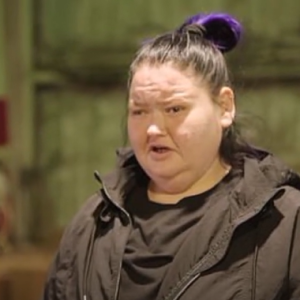The Unfolding Drama of Amy Slaton: Victim or Manipulator?
Amy Slaton, one of the well-known stars of TLC’s hit reality show 1000lb Sisters, has long been recognized for her compelling weight loss journey, her struggles with motherhood, and the intricate complexities of her family life. On the surface, Amy seemed to be the embodiment of resilience—a woman who turned her life around through determination and sheer willpower, inspiring countless fans along the way. Her early success in qualifying for gastric bypass surgery and managing to have children became symbols of hope for many viewers dealing with similar struggles. But as the seasons progressed, a darker, more controversial side of Amy has come to light—one that has divided fans and critics alike.
Recently, Amy has come under fire for her portrayal as a perpetual victim within her own family. Despite her public image of strength and perseverance, many viewers now see her tactics as manipulative. Amy’s emotional outbursts and her repeated claims of being misunderstood have sparked widespread suspicion. Critics argue that she often exaggerates her hardships for attention, painting herself as innocent while subtly stirring up drama. Her tendency to play the victim, especially in conflicts with family members like Tammy and even her brother Chris, has led many to question her motives. Is she genuinely struggling, or is she orchestrating her victimhood to garner sympathy and control the narrative? 
The erupting family conflicts, particularly with her sister Tammy, reveal a tangled web of tension and unresolved anger. While the bond between Amy and Tammy appears deep, their on-screen disagreements showcase a volatile relationship, fraught with accusations of selfishness and manipulation from both sides. Amy’s confrontational approach and Tammy’s retorts have only added fuel to the fire, making their disputes a focal point of public fascination. Meanwhile, family members like Chris express their frustrations in confessional interviews, describing how emotionally draining it is to deal with Amy’s behavior. The family’s struggles—marked by trauma, health issues, and financial stress—seem exacerbated by Amy’s apparent inclination to seek drama rather than resolution.
Adding fuel to the controversy is Amy’s consistent portrayal of herself as misunderstood and unsupported. She frequently turns to social media and her confessional moments on the show to vent her frustrations, often depicting herself as a victim of the family’s neglect or cruelty. Yet, many fans and viewers see through her narrative, accusing her of using her plight as a tool for sympathy rather than genuine suffering. Online communities, especially on Reddit, point out inconsistencies in her stories and behaviors, suggesting she conveniently adopts the victim role whenever conflict arises—sometimes provoking disagreements just to garner attention. Critics argue her dramatized vulnerability is a calculated attempt to maintain audience sympathy at all costs.
As Amy continues to navigate the tumultuous waters of her personal and public life, the question remains: will she acknowledge her part in the family’s discord and seek personal growth? Or will she persist in her role as a victim, further entrenching herself in controversy? The fans hope for a shift toward authenticity, where Amy takes responsibility for her actions, seeks therapy, and repairs her fractured relationships. Ultimately, her story is more than just weight loss and family drama; it’s a raw exploration of trauma, relationships, and personal choices. Whether Amy can rewrite her narrative before her audience tunes out remains to be seen, but one thing is clear—her complex story is far from over.





